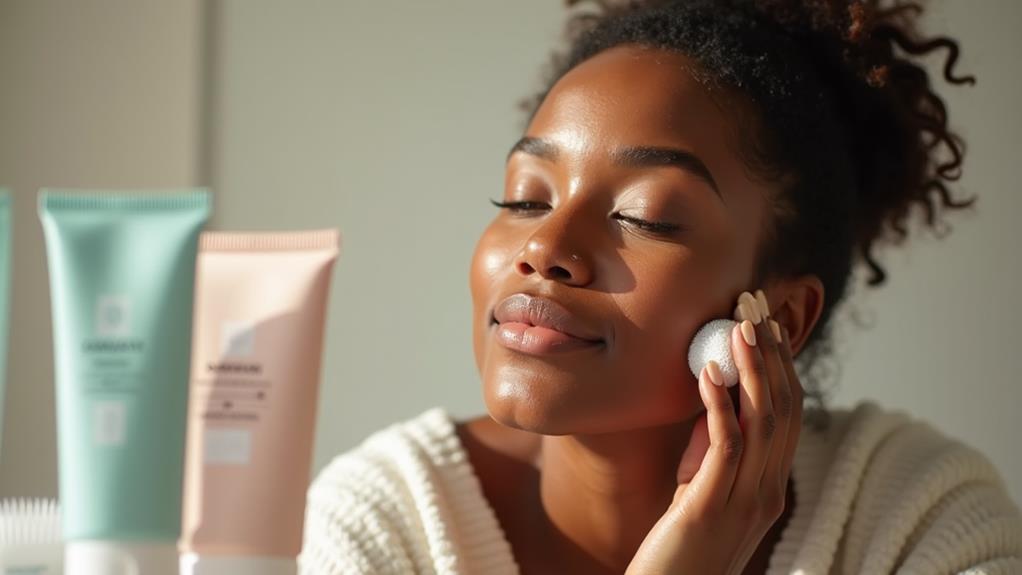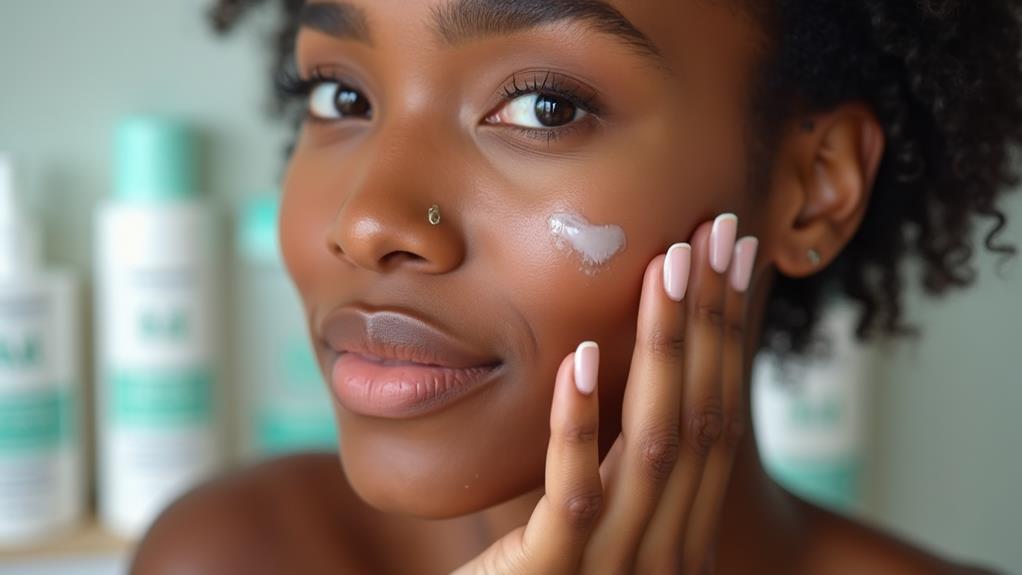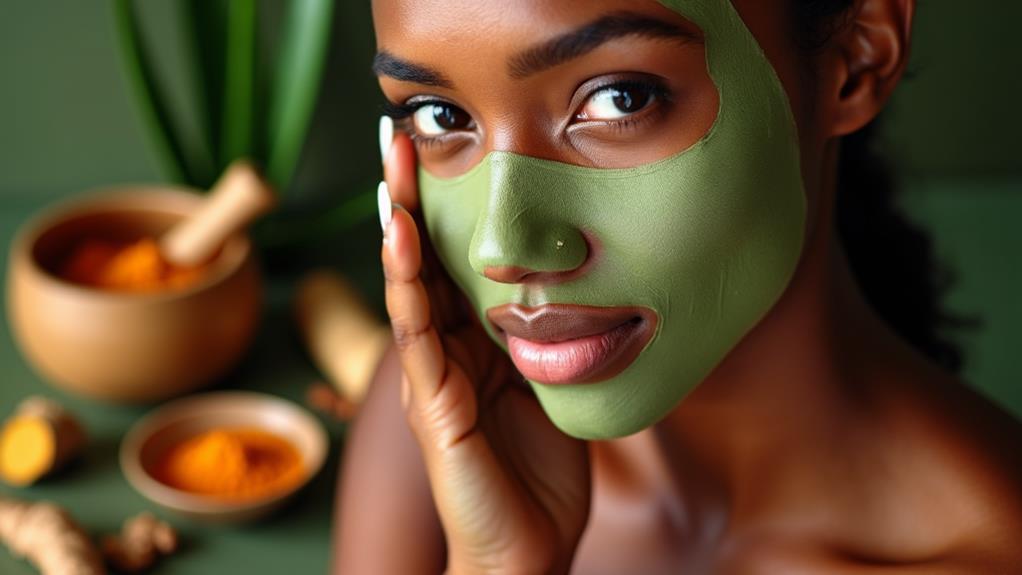Did you know that melanin-rich skin is more prone to post-inflammatory hyperpigmentation (PIH) after acne breakouts? This unique characteristic means that traditional acne treatments often fall short for those with darker complexions. You'll need a tailored approach that not only addresses active blemishes but also prevents long-lasting dark spots. While finding the right balance can be challenging, understanding the specific needs of your skin type is essential for achieving a clear, even-toned complexion. The journey to acne-free skin might seem overwhelming, but with the right strategies, you can reveal the secret to radiant, blemish-free skin that celebrates your natural beauty.
Key Takeaways
- Use gentle, non-comedogenic cleansers to avoid irritation and maintain skin barrier function in darker complexions.
- Incorporate salicylic acid or benzoyl peroxide treatments to target acne while minimizing the risk of post-inflammatory hyperpigmentation.
- Apply non-comedogenic, lightweight moisturizers to balance skin hydration without clogging pores or exacerbating acne.
- Protect skin with broad-spectrum, oil-free sunscreen to prevent UV damage and reduce the likelihood of hyperpigmentation.
- Consider professional treatments like chemical peels or microneedling to improve skin texture and fade acne scars safely.
Understanding Melanin-Rich Skin and Acne

Three key factors make acne treatment for melanin-rich skin unique.
First, your skin produces more melanin, which can lead to post-inflammatory hyperpigmentation (PIH) after acne lesions heal. This means you're more likely to develop dark spots that can last longer than the acne itself.
Second, your skin tends to be more sensitive and prone to irritation, making some traditional acne treatments too harsh.
Third, your skin's natural oils may be thicker, potentially leading to more clogged pores.
Understanding these factors is essential for effective treatment. You'll need to balance addressing active acne while preventing PIH.
Look for gentle, non-irritating products that won't strip your skin of its natural moisture. Ingredients like salicylic acid, niacinamide, and vitamin C can be particularly beneficial. They help unclog pores, reduce inflammation, and fade dark spots without causing excessive dryness or irritation.
It's also important to protect your skin from sun exposure, as UV rays can worsen hyperpigmentation. Always use a broad-spectrum sunscreen, even on cloudy days.
Gentle Cleansing for Darker Complexions
Gentle cleansing sets the stage for effective acne management in darker skin tones. When you're dealing with acne-prone melanin-rich skin, it's essential to choose a cleanser that won't strip your skin of its natural oils or cause irritation.
Look for mild, non-comedogenic cleansers that are free from harsh sulfates and fragrances. Opt for a gentle, pH-balanced cleanser that won't disrupt your skin's natural barrier. Ingredients like glycerin, ceramides, and hyaluronic acid can help maintain moisture while cleansing.
Avoid using hot water, as it can be too harsh on your skin. Instead, use lukewarm water and limit washing to twice a day.
When cleansing, use your fingertips to massage the product into your skin in circular motions. Don't scrub aggressively, as this can lead to inflammation and potential hyperpigmentation. Rinse thoroughly and pat your face dry with a clean, soft towel.
Exfoliation Techniques for Acne-Prone Skin

Exfoliation plays an essential role in managing acne for darker skin tones, but it's important to approach it with care.
You'll want to focus on gentle, non-abrasive methods to avoid irritation and hyperpigmentation.
Chemical exfoliants like alpha-hydroxy acids (AHAs) and beta-hydroxy acids (BHAs) are often more suitable than physical scrubs. Look for products containing glycolic acid or lactic acid (AHAs) for surface exfoliation, or salicylic acid (BHA) to penetrate pores and reduce acne. Start with a low concentration and use it once or twice a week, gradually increasing frequency as your skin adjusts.
If you prefer physical exfoliation, opt for soft, round beads or finely ground natural ingredients like rice powder. Avoid harsh scrubs with large, irregular particles that can cause micro-tears in your skin. Always use a light touch and circular motions when applying.
Remember to moisturize after exfoliating, as your skin may be more sensitive. Choose a non-comedogenic, fragrance-free moisturizer to prevent clogged pores.
Targeted Treatments for Stubborn Breakouts
While exfoliation helps manage acne, some breakouts can be particularly stubborn and require more focused attention. For these persistent spots, you'll need targeted treatments that pack a punch against acne-causing bacteria and excess oil.
Look for products containing benzoyl peroxide, which effectively kills acne bacteria and reduces inflammation. Start with a lower concentration (2.5%) to minimize irritation, especially if you have sensitive skin.
Salicylic acid is another powerful ingredient that unclogs pores and exfoliates dead skin cells. It's gentler than benzoyl peroxide and works well for blackheads and whiteheads.
For darker skin tones, be cautious with spot treatments as they can potentially cause hyperpigmentation. Opt for products with niacinamide or vitamin C, which can help fade dark spots while fighting acne.
Tea tree oil is a natural alternative that has antimicrobial properties and can be less harsh on melanin-rich skin.
Don't forget to moisturize after applying spot treatments, as they can be drying. Choose non-comedogenic, oil-free moisturizers to keep your skin hydrated without clogging pores.
Moisturizing Without Clogging Pores

Moisture is essential for healthy skin, but finding the right balance can be tricky for acne-prone complexions. You'll want to look for lightweight, non-comedogenic moisturizers that won't clog your pores or exacerbate breakouts.
Opt for products containing hyaluronic acid, which hydrates without adding excess oil, or glycerin, which helps retain moisture. When choosing a moisturizer, avoid heavy creams and opt for gel-based or lotion formulations instead. These tend to be less occlusive and allow your skin to breathe.
Look for ingredients like niacinamide, which can help regulate oil production and improve skin texture, or ceramides, which strengthen your skin's barrier function.
Apply your moisturizer to slightly damp skin to lock in hydration. If you have oily skin, you might prefer using a lightweight serum during the day and a more nourishing moisturizer at night.
Don't skip moisturizing, even if your skin feels oily – proper hydration can actually help balance oil production and prevent your skin from overcompensating with excess sebum.
Remember to patch test new products and introduce them gradually to avoid potential irritation or breakouts.
Sun Protection for Acne-Prone Skin
Sun protection is essential for acne-prone skin, especially for those with darker complexions. While melanin offers some natural protection, it doesn't guard against all harmful UV rays.
When you're dealing with acne, you need to be extra careful about sun exposure, as it can worsen hyperpigmentation and scarring.
Look for broad-spectrum sunscreens that are oil-free and non-comedogenic. These won't clog your pores or exacerbate existing breakouts.
Opt for physical sunscreens containing zinc oxide or titanium dioxide, as they're less likely to irritate sensitive skin. If you're concerned about the white cast these may leave, try tinted versions specifically formulated for darker skin tones.
Apply your sunscreen as the last step in your morning skincare routine, after moisturizer but before makeup. Reapply every two hours when outdoors or after swimming or sweating.
Don't forget often-missed areas like your ears, neck, and the back of your hands.
Natural Remedies for Darker Skin

Natural remedies can be particularly effective for treating acne on darker skin tones. These solutions often come with fewer side effects and can be gentler on your skin, reducing the risk of post-inflammatory hyperpigmentation.
Try using tea tree oil, which has antimicrobial properties that can help fight acne-causing bacteria. Dilute it with a carrier oil like jojoba or coconut oil before applying to your skin.
Aloe vera is another excellent option, as it soothes inflammation and promotes healing. Apply a thin layer of fresh aloe gel to affected areas daily.
Green tea contains antioxidants that can help reduce sebum production and inflammation. Use cooled green tea as a toner or apply green tea extract directly to your skin.
Turmeric, known for its anti-inflammatory properties, can be mixed with honey to create a mask that helps fade acne scars and even out skin tone.
Don't forget about the power of diet. Incorporate foods rich in omega-3 fatty acids, like salmon and chia seeds, to help reduce inflammation.
Drink plenty of water and eat antioxidant-rich fruits and vegetables to support your skin's health from the inside out.


